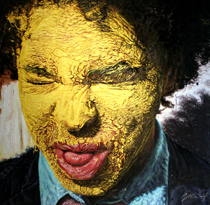Contemplating the Titanic Poetically
George Elliott Clarke
The sinking of the S.S. Titanic, 100 years ago, off the south coast of Newfoundland, still resonates, in part, because it was a catastrophe for which there is no photographic record. Commentators are thus forced to imagine it, to try to realize its horror and shock; to be, in metaphor, witnesses and survivors. So, in the wake of the maritime disaster, three poets take up the task of contemplation, one immediately and two others decades later, but all moved to consider the Titanic’s maiden “ and fatal “ voyage. (Indeed, the Titanic’s foundering conjoins two separate states: the virginal and the mortal; in a sense, the ship’s sinking resembles a pathetic Virgin Death with all the poignancy associated with the dying of a maiden.) All three accounts are irreverent. After all, the Titanic’s loss presents a reality check for anyone who thinks that technology is, in any way, a match for nature.
The great British novelist and poet Thomas Hardy (1840-1928) ponders the tragedy in his The Convergence of the Twain, a poem written and published in 1912, when the dead aboard the broken ship were still corpses, not skeletons. Hardy imagines the feminized liner, a product of human vanity, now Deep,in a solitude of the sea, where œstilly couches she. That verb, couches, is meant to conjure a woman in the posture of lovemaking “ or birthing “ or, of course, dying or dead. Thus, moon-eyed fishes deem the vessel as vaingloriousness, while all her cleaving seductiveness now lays a waste: “Over the mirrors meant / To glass the opulent / The sea-worm crawls” grotesque, slimed, dumb, indifferent.
Hardy views the ship as a bride Prepared for a sinister mate, i.e. the Iceberg, a glistening, shadowy groom. Their meeting is an intimate welding and twin halves of one august event so that consummation comes, and jars two hemispheres: It is a marriage made in Hell; or a cosmic joke: man’s technological pride gets laid or “laid low ” by an anonymous, ephemeral, and icy paramour. Arguably, Hardy reads the downfall of the Titanic as being similar to the tragic fate of one of his own Victorian heroines, such as Tess of the D’Urbervilles.
Newfoundland-born pastor, poet, and professor of English at the University of Toronto, E.J. Pratt (1882-1964), pondered the Titanic in an eponymous poem, published in 1935. Schooled in both Darwin and demonology, Pratt terms the Titanic the Primate of the Lines. That last word refers, simultaneously, to steamship companies, latitude and longitude, and the genealogies of human invention (from the wheel to the automobile). Where Hardy writes a tidy sermon, Pratt treats us to a cinematic survey of the ship’s sumptuous construction, but unlucky launch, as well as of its creature comforts: “On the shelves were pyramids / Of truffles, sprigs of thyme and watercress, / Bay leaf and parsley, savouries to dress / Shad roes and sweetbreads broiling on the grids.” Hardy shows us the twin development of ship and iceberg, and so does Pratt: “Pressure and glacial time had stratified / The berg to the consistency of flint, yes, but it also resembles a floating cathedral, “Ringing the passage of the parallels.â€
The Titanic is master of the Lines, but the iceberg commands the parallels: The duel of the duo is on. But we know the victor: The Titanic goes down, but “The grey shape with the palaeolithic face of the iceberg” remains the master of the longitudes. Pratt’s Titanic is a properly long, dramatic, and great poem (easily besting James Cameron’s film), and only a Newfoundland preacher who saw deaths-by-drowning could have written it.
African-American poet Etheridge Knight (1931-1991) gives the Titanic calamity a ‘lol’ treatment in his rollicking ballad, “I Sing of Shine”,likely published in 1968. Based on a 1920s-era rap, Knight’s poem celebrates a black stoker who turns down offers of money and sex to save white folks lives, and, instead, jumps from the sinking ship. When a white preacher tries to interfere with his stroke, Shine cuts the man’s throat, and is, by dawn, sitting in a Harlem bar, getting drunk. Clearly, the Titanic is the stuff of legend. As such, it is more unsinkable than the actual ship proved to be.





George,
Thanks so much for giving Pratt fair and generous treatment. His Titanic is a titanic achievement in Canadian poetry, unparalleled in scope, magnificent in its lines, shining at the bottom of the sea (Klien). If I’m not mistaken, there was a CBC reading of the entire poem at some point in the not too distant past. I wonder if that might be resurrected.
I am wondering if George would review my collection, Hugging The Huge Father (expanded version)? Thanks, Chad
Hello Chad. You can reach Prof. Clarke at the English department of University of Toronto. Please check their website for the English department’s address. I suggest you send him your book at that address.